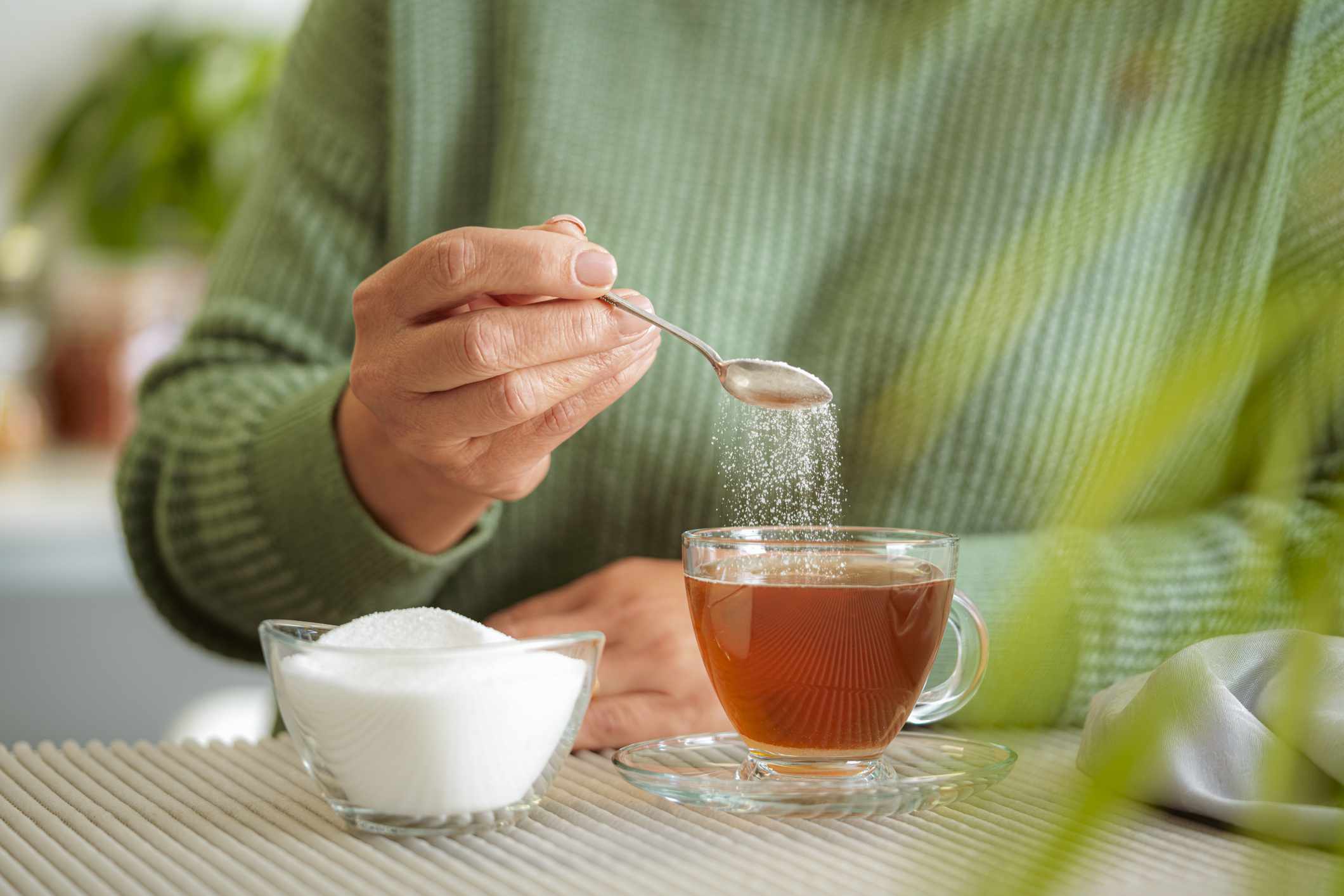
:max_bytes(150000):strip_icc():format(jpeg)/Health-GettyImages-2154584092-2401180acc754d6293d1f312bcadb359.jpg)
Erythritol and stevia are low-calorie sweeteners commonly used as sugar replacements.
Using erythritol and stevia instead of sugar and other sweeteners, like corn syrup and agave, could support better blood sugar management, improve dental health, and reduce calorie intake.
Though these low-calorie sweeteners have a few things in common, they also have some major differences. When choosing which sweetener is best for you, consider the nutrition, taste, and safety of long-term consumption.
Erythritol is a type of sugar alcohol, which are sugar derivatives that naturally occur in some foods, like fruits, and are commercially produced for use as low-calorie sugar substitutes.
Small amounts of erythritol are naturally in foods like watermelon, grapes, cheese, and soy sauce. It’s also produced commercially and is popularly used as a low-calorie sweetener. Erythritol is sold on its own and is also commonly mixed with other sweeteners, like stevia and monk fruit, to create sugar substitutes that closely resemble the taste of table sugar.
Erythritol provides 0.2 calories per gram (g) and is about 70% as sweet as table sugar. It has a glycemic index (GI) of zero, meaning it does not affect blood sugar.
The GI is a classification system that ranks carbohydrate-rich foods on a scale of 0-100 according to their effects on blood sugar levels. Low-GI foods score less than 55, moderate GI foods score between 56-69, and high-GI foods score 70 or greater.
Stevia is made from extracts of the leaves of the Stevia rebaudiana Bertoni plant. The leaves of this plant have been used as a natural sweetener since ancient times. Today, stevia-based sweeteners are among the most popular natural sweeteners in the United States.
The sweetness of stevia comes from compounds called steviol glycosides, which are around 200-400 times sweeter than table sugar.
Like erythritol, stevia has a GI of zero and is commonly used in sugar-free products, like desserts and snack foods.
Since stevia and erythritol have no effect on blood sugar levels and are lower in calories than sweeteners like table sugar, they offer several health benefits when used as a sugar substitute.
Could Support Better Blood Sugar Control
Sweeteners like table sugar, corn syrup, and agave significantly affect blood sugar and insulin levels. Consuming these sweeteners too often can increase the risk of health conditions like type 2 diabetes and obesity.
Replacing caloric sweeteners with sugar substitutes like erythritol and stevia can improve blood sugar levels, help you maintain better blood sugar management, and reduce your risk of common health conditions. Choosing blood sugar-friendly sweeteners is especially important for people with high blood sugar, such as people with diabetes.
Table sugar has a GI of 65, which is considered medium. Erythritol and stevia both have a GI of zero and have no effect on blood sugar. Replacing sugar and other sweeteners with stevia or erythritol-based products could help improve blood sugar control and support short and long-term blood sugar regulation.
May Reduce Calorie Intake
Erythritol contains 95% fewer calories than table sugar, while stevia is calorie-free.
Because of their very low-calorie content, erythritol and stevia can be beneficial choices for people looking for simple ways to decrease their calorie intake. For example, using zero-calorie stevia instead of sweeteners like agave nectar, which contains 64.2 calories per tablespoon (tbsp), can help you reduce your total calories.
Erythritol and stevia have also been shown to reduce hunger levels and energy intake, which can support weight loss. A small study of 20 people found that participants who consumed 50 g of erythritol 15 minutes before eating a meal consumed significantly fewer calories than participants who received the artificial sweetener sucralose, table sugar, or tap water before their meal.
Erythritol may reduce appetite by increasing satiety hormones, like cholecystokinin (CCK), which promote feelings of fullness after eating.
Stevia-based beverages have also been shown to reduce calorie intake when consumed before a meal. One study found that people who drank a stevia-sweetened beverage before a meal consumed significantly fewer calories than people who drank plain water before their meal.
Could Protect Your Teeth
Eating sugary foods and drinking sugary beverages can damage your oral health. Cavity-causing bacteria, such as Streptococcus mutans (S. mutans), feed on sugar, producing acids that break down tooth enamel and make your teeth more susceptible to cavities.
Replacing sugar with stevia or erythritol can help prevent cavities and protect your overall oral health by protecting tooth enamel, decreasing acid production, and reducing the growth of cavity-causing microbes. This can help prevent the development of cavities, gum disease, and other oral health conditions.
Though erythritol and stevia are associated with several health benefits, they both have downsides to consider.
Stevia Downsides
Unlike caloric sweeteners like sugar and agave, stevia is broken down by bacteria in the colon and directly interacts with gut bacteria. Though research is conflicting, some study findings suggest that regularly consuming stevia may negatively affect the composition of and disrupt communication between gut bacteria.
However, a recent study found that adults who consumed five drops of stevia twice daily for 12 weeks had no significant changes to their gut bacteria compared to baseline or to adults who consumed a control treatment.
Findings from animal studies also suggest that stevia may negatively affect liver and kidney health and increase inflammatory markers, though these side effects haven’t been confirmed in humans.
More research is needed to confirm the safety of stevia on human health, especially when used in high doses over long periods.
Erythritol Downsides
While stevia hasn’t been linked to serious side effects in humans, erythritol consumption is associated with several health concerns.
Long-term erythritol intake has been linked to an increased risk of heart attack and stroke. A study that included over 3,000 U.S. and European adults found that people with the highest blood levels of erythritol were about twice as likely to experience cardiovascular events, such as heart attacks and strokes, over a three-year period compared to people with the lowest levels.
Erythritol may raise the risk of heart complications by increasing blood clot formation and artery blockages. Some studies have also linked erythritol use to an increased risk of type 2 diabetes and abdominal fat gain.
Research on the safety of erythritol is limited, and larger studies are needed to investigate these potential adverse health effects.
In addition to the potential long-term health risks associated with erythritol consumption, taking in high doses of erythritol may lead to temporary symptoms such as:
- Diarrhea
- Bloating
- Nausea
- Gas
- Stomach pain
These side effects are typically associated with consuming large doses of erythritol exceeding 0.66 g and 0.80 g per kilogram (kg) of body weight per day for men and women, respectively.
Erythritol and stevia are both very sweet, but erythritol is less sweet than stevia.
Erythritol is about 70% as sweet as table sugar, while stevia is 200-400 times sweeter than sugar, so you would need to use more erythritol than you would stevia to reach your desired sweetness level.
Both of these sweeteners are available in granulated, powdered, and liquid form and can be used in cooking and baking and to sweeten beverages like coffee.
The steviol glycosides in stevia interact with both sweet and bitter taste receptors on your tongue, which is why stevia can have a bitter aftertaste. This is why erythritol, which doesn’t have a bitter aftertaste, is often added to stevia products to mask its flavor.
Erythritol and steviol glycosides (stevia extracts) are generally recognized as safe (GRAS) by the U.S. Food and Drug Administration (FDA). Stevia leaf and crude stevia extracts are not GRAS.
Although the FDA considers erythritol and stevia glycosides GRAS, consuming too much of these sweeteners may harm health. It’s important to keep your intake of these sweeteners below the recommended intake levels.
Regulatory agencies like the World Health Organization (WHO) and the FDA recommend keeping your intake of steviol glycosides below 4 milligrams (mg)/kg per day.
To avoid gastrointestinal (GI) side effects, it’s recommended that men and women keep their daily intake of erythritol under 0.66 and 0.80 g/kg, respectively.
While more research is needed, regular erythritol use may increase the risk of heart attack and stroke, so it may be best to limit your intake in general, especially if you have a history of heart disease.
Stevia and erythritol can both be used as blood sugar-friendly alternatives to sweeteners like table sugar. When deciding which one is best for you, consider safety, taste, and other factors.
Because stevia isn’t linked to the same health concerns as erythritol, it may be a safer choice. However, erythritol is often used to enhance the flavor and volume of stevia products, so be sure to check ingredient labels if you’d prefer to avoid erythritol.
If you’d like a sweetener that doesn’t have the bitter aftertaste often associated with stevia, monk fruit is a good alternative. Monk fruit is a zero-calorie sweetener that’s 300 times sweeter than table sugar, doesn’t affect blood sugar levels, and doesn’t have a bitter aftertaste. It’s also safe and isn’t associated with any health risks or side effects.
No matter which sugar substitute you decide to use, it’s best to enjoy all sweeteners, including zero- and low-calorie sweeteners, in moderation. This can help you avoid any risks and side effects associated with consuming large amounts of sugar substitutes.
Erythritol and stevia are popular sugar replacements that have been linked with a few health benefits, such as promoting healthy blood sugar management and protecting oral health.
While both sweeteners can be included in balanced diets, erythritol has been linked with more serious health concerns than stevia, such as an increased risk of heart attack and stroke. Stevia and other sweeteners like monk fruit may be a better choice for health than erythritol.







